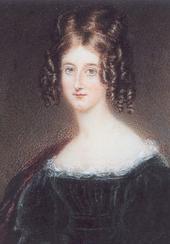My name is Augusta Byron Leigh, and I was born on January 26, 1783. My father was Lord John Byron, 5th Baron Byron of Rochdale, but he was known as Mad Jack by most. My mother was Amelia Osborne, my father's first wife. She died shortly after I was born and I was brought up by my grandmother, Lady Holderness, who died when I was still a young girl. I spent the rest of my childhood with family and friends, and then married Colonel George Leigh.
I did not meet my younger (by five years) half-brother, George Gordon Byron, until he began attendance at Harrow school in 1801, and even then only rarely. Three years later I found myself in a close correspondence with him, writing to him regularly. He argued frequently with his mother, and I was his confidante. He was beginning to write poetry and I was magnetically drawn to his beautiful verses. He would become one of the most celebrated Romantic poets.
He went abroad in 1809, traveling as young gentlemen often did at that age. He had to avoid most of Europe, due to Napoleon's wars, and traveled to the Mediterranean instead.
In 1811, he returned from his travels abroad. I was a mother, several times over, but troubles between myself and my husband had caused us to separate in the spring. The time we spent over the next few years was the happiest time of my life and of his I think as well. Around this time rumors began to circulate (helped by George's friend Lady Caroline Lamb) that we were intimate.
My daughter, Elizabeth Medora Leigh, was born on April 15, 1814, and resembled her uncle so much that I named her after one of his heroines, Medora, from The Corsair. George loved her dearly, and she him.
On January 2, 1815, he was married to Lady Caroline Lamb's cousin, Anne Isabella Millbank. Unfortunately, they were not suited for each other, and had a turbulent marriage. They had one daughter, Ada, but George was disappointed that he did not have a son. On January 16, 1816, Lady Byron left him, and on April 21, 1816, George finally signed the Deed of Separation. Afterwards, Anne and Caroline spread vicious rumors about him; the rumors were of violence and adultery on George's part, and also reiterated the suspicions that George and myself were intimate with each other and that Elizabeth Medora was his child. He said to me that "Even to have such a thing said is utter destruction & ruin to a man from which he can never recover." Things would never be the same between us, and we saw each other rarely, but still kept up a steady correspondence throughout all of his travels. I stayed at home, reconciling with my husband, and raised my children.
He retreated into his poetry, becoming friends with Percy Bysshe Shelley and his wife-to-be Mary Godwin later that year. Together, in Switzerland, they came together, writing fantastical stories. Mary Godwin Shelley wrote her novel Frankenstein. George wrote a fragment of a story in verse, and it was published as a postscript to his poem Mazeppa.
George became very political around this time, visiting Venice and becoming familiar with Armenian culture. He wrote Epistle of Paul to the Corinthians and is said to have begun the study of Armenian culture, or Armeneology. In 1822 he started a short-lived newspaper with Percy Shelley and Leigh Hunt called The Liberal. In 1823 he traveled to Greece, to offer his support to the fight for Greek independance from the Ottoman Empire. On April 19, 1824, he died, after having a serious cold and fever.
I spent the rest of my life missing him terribly. Elizabeth Medora was very much like her uncle, making rash decisions and forming unusual attachments. She ran away with her older sister Georgiana's husband, Henry Trevanion. She bore him a daughter in 1834, Marie. She traveled to France, taking up with Jean-Louis Taillefer, bearing him a son, Elie, in January of 1846. They married in August of 1848, gratefully legitimating both of her children. My Elizabeth Medora died in France on August 28, 1849. I followed her on October 12, 1851. My last years were spent in grief, for my daughter, and for my beloved George.
